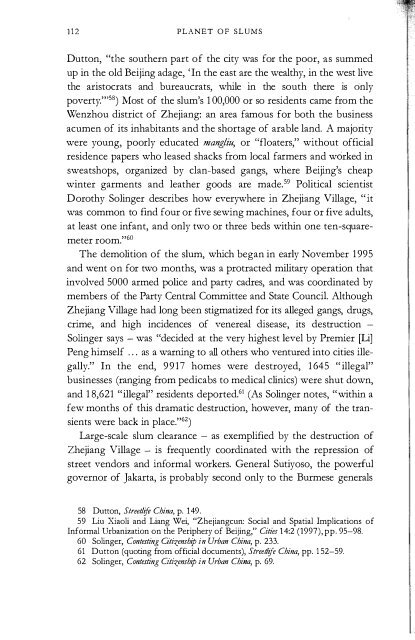Untitled - Rebel Studies Library
Untitled - Rebel Studies Library
Untitled - Rebel Studies Library
Create successful ePaper yourself
Turn your PDF publications into a flip-book with our unique Google optimized e-Paper software.
112 PLANET OF SLUMS<br />
Dutton, "the southern part of the city was for the poor, as summed<br />
up in the old Beijing adage, 'In the east are the wealthy, in the west live<br />
the aristocrats and bureaucrats, while in the south there is only<br />
poverty."'58) Most of the slum's 1 00,000 or so residents came from the<br />
Wenzhou district of Zhejiang: an area famous for both the business<br />
acumen of its inhabitants and the shortage of arable land. A majority<br />
were young, poorly educated mangliu, or "floaters," without official<br />
residence papers who leased shacks from local farmers and worked in<br />
sweatshops, organized by clan-based gangs, where Beijing's cheap<br />
winter garments and leather goods are made. 59 Political scientist<br />
Dorothy Solinger describes how everywhere in Zhejiang Village, "it<br />
was common to find four or five sewing machines, four or five adults,<br />
at least one infant, and only two or three beds within one ten-squaremeter<br />
room."60<br />
The demolition of the slum, which began in early November 1995<br />
and went on for two months, was a protracted military operation that<br />
involved 5000 armed police and party cadres, and was coordinated by<br />
members of the Party Central Committee and State CounciL Although<br />
Zhejiang Village had long been stigmatized for its alleged gangs, drugs,<br />
crime, and high incidences of venereal disease, its destruction -<br />
Solinger says - was "decided at the very highest level by Premier [Ii]<br />
Peng himself . .. as a warning to all others who ventured into cities illegally."<br />
In the end, 9917 homes were destroyed, 1645 "illegal"<br />
businesses (ranging from pedicabs to medical clinics) were shut down,<br />
and 18,621 "illegal" residents deported.61 (As Solinger notes, "within a<br />
few months of this dramatic destruction, however, many of the transients<br />
were back in place."62)<br />
Large-scale slum clearance - as exemplified by the destruction of<br />
Zhejiang Village - is frequently coordinated with the repression of<br />
street vendors and informal workers. General Sutiyoso, the powerful<br />
governor of Jakarta, is probably second only to the Burmese generals<br />
58 Dutton, Street/ife China, p. 149.<br />
59 Liu Xiaoli and Liang Wei, "Zhejiangcun: Social and Spatial Implications of<br />
Informal Urbanization on the Periphery of Beijing," Cities 14:2 (1997), pp. 95-98.<br />
60 Solinger, Contesting Citizenship in Urban China, p. 233.<br />
61 Dutton (quoting from official documents), Street/ife China, pp. 152-59.<br />
62 Solinger, Contesting Citizenship in Urban China, p. 69.<br />
HAUSSMANN IN THE TROPICS 113<br />
in his abuse of the human rights of the poor in Asia. Notorious for his<br />
persecution of dissent under the Suharto dictatorship, Sutiyoso has<br />
since 2001 "made it his personal crusade to clear Jakarta of informal<br />
kampungs, as well as its vendors, street musicians, homeless people, and<br />
pedicabs." With support from big business, mega-developers, and,<br />
more recently, President Megawati herself, the governor has evicted<br />
more than 50,000 slum-dwellers, thrown 34,000 pedicab drivers out of<br />
work, demolished the stalls of 21,000 street vendors, and arrested<br />
hundreds of street musicians. His ostensible aim is to make Jakarta<br />
(population 12 million) into a "second Singapore," but grassroots<br />
opponents, such as the Urban Poor Consortium, have charged that he<br />
is simply clearing slums for future development by his influential<br />
backers and political cronies.63<br />
If some slum-dwellers commit the "crime" of being in the path of<br />
progress, others err by daring to practice democracy. In the aftermath<br />
of the corruption-tainted 2005 Zimbabwe elections, President Robert<br />
Mugabe turned his wrath against the street markets and shantytowns of<br />
Harare and Bulawayo, where the poor had voted in large numbers for<br />
the opposition Movement for Democratic Change (MDC). The first<br />
stage of sinisterly titled Operation Murambasvina (" Drive Out Trash")<br />
in early May was a police assault on the city's 34 flea markets. One<br />
police official reportedly urged his men: "From tomorrow, I need<br />
reports on my desk saying that we have shot people. The President has<br />
given his full support for this operation so there is nothing to fear. You<br />
should treat this operation as war. , , 64<br />
And the police did. Stalls and inventories were systematically burned<br />
or looted, and more than 17,000 traders and jitney drivers were<br />
arrested. A week later, the police began to bulldoze shacks in MDC<br />
strongholds as well as in pro-Mugabe slums (Chimoi and Nyadzonio,<br />
for instance) that were located in areas coveted for redevelopment.<br />
In one case, Hatcliffe Extension west of Harare, the police evicted<br />
63 Asian Coalition for Housing Rights, "Housing by People in Asia," as well as<br />
press releases from the Asian Human Rights Commission and Urban Poor<br />
Consortium (see Urban Poor website: www.urbanpoor.or.id).<br />
64 Munyaradzi Gwisai, "Mass Action Can Stop Operation Murambasvina,"<br />
International Socialist Organisation (Zimbabwe), 30 May 2005; BBC News, 27 May<br />
2005; Guardian, 28 May 2005; Los Angeles Times, 29 May 2005.


